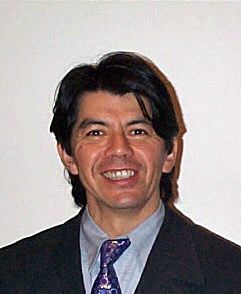Biography:Bernard Foing
Bernard Foing | |
|---|---|
 | |
| Born | |
| Alma mater | Ecole Normale Supérieure of Education & Technology[1] |
| Known for | Principal Project Scientist for SMART-1 |
| Spouse(s) | Pascale Ehrenfreund |
Bernard Foing is a French scientist at the European Space Agency (ESA),[2] Executive Director of the International Lunar Exploration Working Group (ILEWG)[3] and was Principal Project Scientist for SMART-1, the first European mission to the Moon.[4] He is also a research professor at the VU Amsterdam and at Florida Tech.[5]
Biography
Born in France,[1] Bernard Foing has a PhD in Astrophysics and Space Techniques.[6] He worked 3 years in Chile as an astronomer for the European Southern Observatory (ESO),[6] the French embassy, and as Professor of Astrophysics.[1] A researcher at French National Centre for Scientific Research (CNRS) since 1986,[7] Foing obtained the Habilitation for direction of research in 1990.[7] At ESA since 1993, he is Senior Research Coordinator at the Research and Scientific Support Department.[6] He was president of ILEWG in 1998-2000 and now is their Executive Director.[6] Foing collaborates with his wife, Pascale Ehrenfreund of the German Aerospace Center, in some of his research.[8]
SMART-1
Foing is known as the father of SMART-1.[3][9] Serving as Principal Project Scientist from conception in 1996,[4] SMART-1 was the first European mission to the Moon.[10] SMART-1's goals were both technological and scientific.[11] First in a series of "Small Missions for Advanced Research in Technology",[11] SMART-1 was used to test new state-of-the art instruments such as a solar-electric primary propulsion system.[12] SMART-1 also performed scientific observations of the Moon including determining the Moon's mineralogical composition and the presence and quantity of water in the craters at the Moon's south pole.[12] Launched on September 27, 2003,[13] SMART-1 entered lunar orbit in November 2004[14] and continued orbit until it was intentionally crashed into the lunar surface on September 3, 2006.[15][16] Said Foing, "SMART-1 data are helping to choose future landing sites for robotic and possible manned missions, and its instruments are upgraded and being flown again on the next generation of lunar satellites."[17]
Mars Express
Foing is an organic chemist for Mars Express,[18] a space exploration mission by the European Space Agency.[19] Launched on June 2, 2004,[20] Mars Express is the first planetary mission attempted by the agency.[19] Foing is also co-investigator of the High Resolution Stereo Camera (HRSC) for the Mars Express orbiter.[21] The HRSC is a high-resolution camera that can make full-color 3-D images of Mars's surface.[22] The camera can also zoom in for a closer look and may be helpful in identifying useful landing sites for future Mars missions.[22]
Bibliography
Foing has published over 400 articles, including 160 refereed papers, in lunar and planetary science and exploration, solar/stellar physics and astrobiology.[1] He edited 16 books and organized over 50 international conferences and symposia.[1]
References
- ↑ 1.0 1.1 1.2 1.3 1.4 "MDRS: Crew 77 Biographies". The Mars Society. http://desert.marssociety.org/fs08/crew77/. Retrieved 2009-08-29.
- ↑ "Synthesis of SMART-1 lunar results for future exploration | Lunar Science Forum 2009". NASA. Archived from the original on 2009-07-31. https://web.archive.org/web/20090731140247/http://lunarscience2009.arc.nasa.gov/node/167. Retrieved 2009-08-30.
- ↑ 3.0 3.1 "Moon Seen as Laboratory for Life". Space.com. 3 April 2008. http://www.space.com/scienceastronomy/080403-am-moon-development.html. Retrieved 2009-08-29.
- ↑ 4.0 4.1 "Our 8th Continent, the Moon". Japan Aerospace Exploration Agency. http://www.jaxa.jp/article/special/lunar/foing_e.html. Retrieved 2009-08-30.
- ↑ "Bernard Foing - Personal Profiles - Cosmos". https://www.cosmos.esa.int/web/personal-profiles/bernard-foing. Retrieved 2021-04-14.
- ↑ 6.0 6.1 6.2 6.3 "SMART-1 Mission Operations and Lunar Results". China National Space Administration. Archived from the original on 2011-04-02. https://web.archive.org/web/20110402221030/http://www.cnsa.gov.cn/n615708/n984628/n984631/72050.html. Retrieved 2009-08-29.
- ↑ 7.0 7.1 "RSSD - Internal seminars 2006". European Space Agency. http://www.rssd.esa.int/index.php?project=TOP&page=intseminars2006. Retrieved 2009-08-30.
- ↑ Ehrenfreund, Pascale (8 November 2011). "A Multiple-Choice Essay". Astrobiology 11 (8): 737–741. doi:10.1089/ast.2011.0697. PMID 22007739. Bibcode: 2011AsBio..11..737E. https://www.gwu.edu/~spi/assets/docs/2011%20AST%20Pascale.pdf. Retrieved 28 November 2015.
- ↑ Highfield, Roger (2008-04-17). "I'll grow marigolds on the moon, says scientist". The Daily Telegraph (London). https://www.telegraph.co.uk/science/science-news/3340048/Ill-grow-marigolds-on-the-moon-says-scientist.html. Retrieved 2009-08-30.
- ↑ "Europe probe arrives at the Moon". BBC News. 2004-11-16. http://news.bbc.co.uk/2/hi/science/nature/4015227.stm. Retrieved 2009-08-29.
- ↑ 11.0 11.1 "ESA Portal - United Kingdom - SMART-1: the lunar adventure begins". European Space Agency. http://www.esa.int/esaCP/SEMBTIYO4HD_UnitedKingdom_0.html. Retrieved 2009-08-30.
- ↑ 12.0 12.1 "ESA Science & Technology: SMART-1". European Space Agency. http://sci.esa.int/science-e/www/area/index.cfm?fareaid=10. Retrieved 2009-08-30.
- ↑ "SMART-1 Space Probe Slams into the Moon". Space.com. 3 September 2006. http://www.space.com/missionlaunches/060903_smart-1_impact.html. Retrieved 2009-08-30.
- ↑ Choi, Charles Q. (2007-09-17). "The enduring mysteries of the moon". USA Today. https://www.usatoday.com/tech/science/space/2007-09-17-moon-mysteries_N.htm. Retrieved 2009-08-29.
- ↑ "Spacecraft crashes onto Moon". Cosmos. Archived from the original on 2008-07-30. https://web.archive.org/web/20080730024914/http://www.cosmosmagazine.com/news/620/spacecraft-crashes-moon. Retrieved 2009-08-29.
- ↑ "ESA - SMART-1 - Intense final hours for SMART-1". European Space Agency. http://www.esa.int/SPECIALS/SMART-1/SEMV386LARE_0.html. Retrieved 2009-08-30.
- ↑ "SMART-1's bridge to the future exploration of the Moon". European Space Agency. http://www.esa.int/SPECIALS/SMART-1/SEMEZ2N0LYE_0.html. Retrieved 2009-08-30.
- ↑ Perlman, David (2004-04-02). "Methane found in Mars atmosphere / Scientist offers a few theories for presence of gas exuded by life forms". San Francisco Chronicle. http://www.sfgate.com/cgi-bin/article.cgi?file=/c/a/2004/04/02/MNG4I5VJSC1.DTL. Retrieved 2009-08-30.
- ↑ 19.0 19.1 "Mars Express sees its first water". European Space Agency. http://www.esa.int/SPECIALS/Mars_Express/SEM8ZB474OD_0.html. Retrieved 2009-08-30.
- ↑ "Europe goes to Mars". BBC News. 2003-06-03. http://news.bbc.co.uk/2/hi/sci/tech/2955910.stm. Retrieved 2009-08-30.
- ↑ "Bernard H. Foing". École Polytechnique Fédérale de Lausanne. Archived from the original on August 9, 2009. https://web.archive.org/web/20090809233832/http://space.epfl.ch/page43471.html. Retrieved 2009-08-29.
- ↑ 22.0 22.1 "Mars Express". Discover Magazine. http://www.discovermagazine.com/2003/may/cover. Retrieved 2009-08-30.
External links
- If We Had No Moon - An essay by Bernard Foing
- Noah's Ark on the Moon - An essay by Bernard Foing
- Planetary Radio - Interviews conducted by The Planetary Society
- The Space Show - Interview conducted by David Livingston August 11, 2009; (MP3)
- Talk of Bernard Foing at the Origins 2011 congress
 |
